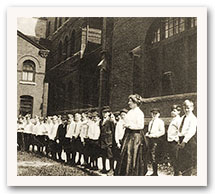Founding Principles
A New Welfare Policy, MN Legislation (1885): The State Public School for Dependent and Neglected Children was created in 1885 and would become a state-of-the-art institution. The effort began with State Board of Charities Secretary Reverend Hastings H. Hart and Minnesota's 9th Governor Lucius Hubbard creating an act for the legislature. This act was almost an exact copy of a Michigan law which created an orphanage in Coldwater, Michigan. It was considered ideal in every way. Through a rigorous process, Owatonna was chosen as the site for the school. Owatonna's geographic location as the center of the densely populated Southern Minnesotan rural areas and access to crisscross railroad lines were key factors in its selection.
Michigan's Philosophy: Dependent children are not delinquent and can be saved. Preventive measures such as a pastoral environment and discipline could render children acceptable to a new family. Once admitted, children would become a part of the following institutional system: 
Family-Like Life in Cottages: Cottages will consist of approximately 25 children with a female matron as a surrogate mother. It is hoped the children will live in the cottage less than a year while eating in a common dining room and working, playing, and praying together.
Being Placed Out: If possible, the dependent children "after their basic training," will be "placed out," (adopted, or indentured) preferably in rural homes. State Agents will be responsible for selecting "suitable homes" for children, and for annual inspection thereafter of such placements.
Emphasis on Discipline and Useful Labor: Order, usefulness, and discipline will be stressed, as well as obedience and efficiency. Gentle and loving measures will be advocated, but the value of drill, discipline and labor can never beunderestimated. It is believed labor, no matter how dreary the task, or how paltry the remuneration, is good for the children.Each child, no matter the age, should be a part of some "worthwhile, demanding activity" each day.
Education: The State Public School will be a State Primary School where the children, until they can be adopted or indentured, can be educated morally and mentally, also taught habits of industry.
Emphasis on Religious & Moral Training: Minnesota's Policy: "It is felt that moral compromise within the Ward's family is, in many cases, a key factor in their dependence upon the State. For this reason children must be retrained in morality that they may be led by a straight moral compass." In the early years, a non-denominational "special temperance training" was taught Sundays and each night in the cottages by the superintendent, teacher or matron. A Sabbath School was also hosted right on campus, led by local volunteers. Later, Wards attended compulsory church service on Sunday in the auditorium with a rotation of different local clergy each week. Some were bused to a specific local denominational church, for an additional service after the School's non-denominational service. Wards were expected to say grace at meals and prayers each evening, whether these were silent or aloud depended on the matron.

